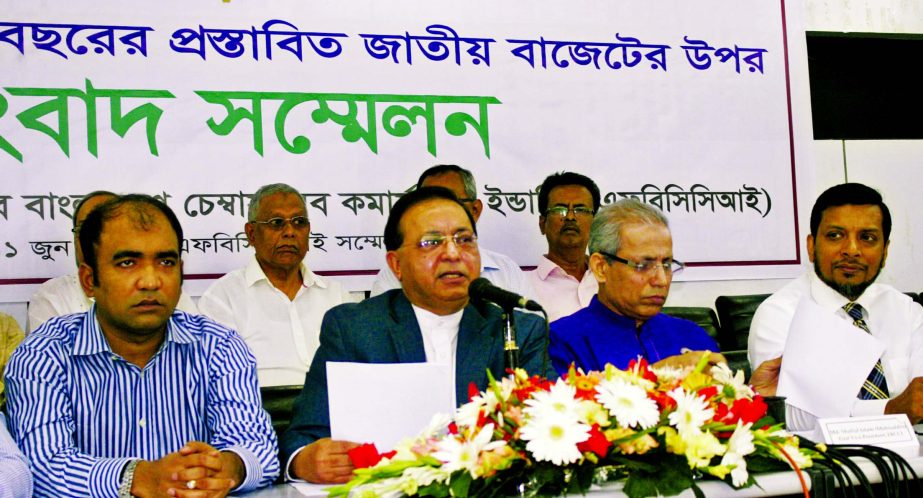
Economic Reporter :a
The country’s apex trade body on Saturday urged the government to come up with a specific investment policy fixing single digit lending interest rate in all banks and financial
institutions to ensure desired higher growth with increased investment.
“It’s not possible to continue pace of economic advancement without desired investment and industrialisation,” Federation of Bangladesh Chambers of Commerce and Industry (FBCCI) President Abdul Matlub Ahmad told a post-budget press conference at the Federation Bhaban in the city.
He said both public and private investment will have to be increased significantly to have 34.4 percent investment of GDP to 7.2 percent GDP growth in the coming fiscal year and 8 percent growth by 2020.
The FBCCI president expressed displeasure over less attention to their proposals made before the budget through discussions with the National Board of Revenue (NBR).
Matlub said they placed 447 proposals in the areas of VAT, import duty and income tax before the budget. But only 53, or around 11.85 percent proposals were reflected in the proposed budget.
After four months’ hard work and a few dozens of meetings with the NBR along with all associations and chambers only such a few proposals are accommodated, he said.
“More than this would have come automatically come. This is shameful for the apex trade body. We may never sit with the NBR on budget issue in the future,” Matlub said.
This was the third media briefing by the FBCCI after Finance Minister AMA Muhith placed the budget in parliament. FBCCI first vice president M Shafiul Islam Mohiuddin and others were present at the press conference.
The FBCCI president proposed keeping the source tax on export at 0.6 percent instead of 1.5 percent as proposed by the Finance Minister in the budget mentioning that nowhere in the world tax is deducted at source.
He also proposed bringing down corporate tax rate at 10 percent in the garment sector. In the proposed budget, the government reduced the corporate tax to 20 percent from 30 percent.
Earlier on June 3, the FBCCI expressed displeasure over the proposed 1.5 percent tax at source on export terming at ‘abnormal and absurd’. “We think (this 1.5pc) tax should be deducted on export profit,” FBCCI first vice president Mohiuddin told another post-budget press conference mentioning that tax at source is deducted on sales, not on profit.
The FBCCI president, in his written speech, demanded overall presentation of the situation regarding US$ 80 million Bangladesh Bank fund that ended up in accounts located in the Philippines through illegal transfer and overall situation in the banking sector in Parliament.
“There has been negative impact on the banking sector discipline following the hacking of US$ 80 million and embezzlement of funds in various banks. But, in the budget speech, these have not been flagged,” Matlub said.
He urged the government to let them know about government’s specific work plan and future planning for ensuring overall security and proper management in the financial sector.
Placing a number of proposals regarding VAT (value added service), the FBCCI president said the VAT collection process and small and medium industry sector and overall industrialisation process might collapse if their proposals are not implemented.
Around 36 percent of total revenue earnings come from VAT.
Matlub said they have taken post-budget opinions from FBCCI member organisations and they will place their specific proposals to the government highlighting the areas that remain unaddressed in the proposed budget. “We hope to have a positive response from the government,” said the apex trade body chief.

